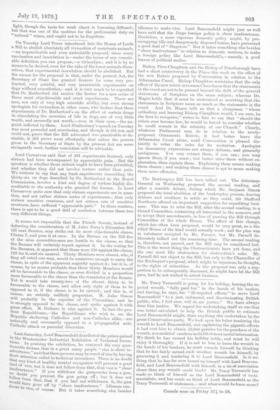The Committee on Foreign Wines has reported against the existing
method of calculating the duties. We now levy a duty of a shilling a gallon on wine below the alcoholic strength of twenty-six degrees, and of half-a-crown on wine above that strength. The effect of this arrangement is that a differential duty exists against port and sherry, which are always " forti- fied " to an extent above the minimum, and that Spain and. Portugal, in retaliation, have taxed English goods,—the latter Power to an almost prohibitory rate. The Committee, there- fore, propose that while a shilling a gallon shall be retained as the minimum, the stronger wines, instead of being taxed at half-a-crown whatever their strength, shall pay duty only in proportion to the amount of alcohol above twenty-six degrees. That seems fair from the fiscal side ; but we thought one object of the new wine duties was to give the importers of light wines an advantage, not for fiscal reasons, but on :moral grounds, the idea being that light wine, if it became popular, would tend to make the people temperate. We fear the effect has been •
light, though the taste for weak claret is becoming diffused; but that was one of the motives for the preferential duty on natural" wines, and ought not to be forgotten.



































 Previous page
Previous page